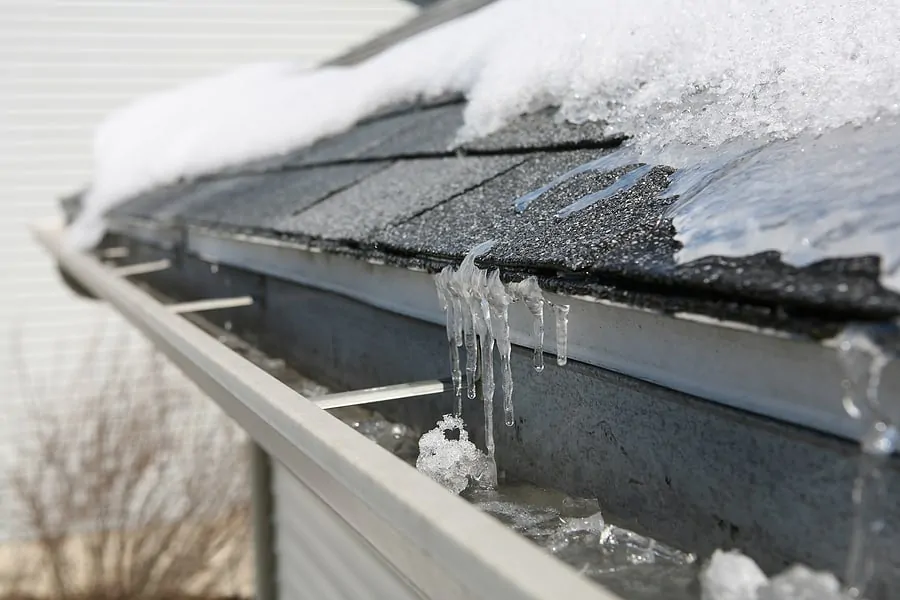Winter weather can be harsh on your home. Your home takes a beating during the winter months, from the cold temperatures to the snow and ice. If you are not careful, the damage can add up quickly. In this blog post, we will discuss some of the ways that winter weather can damage your home and prevention tips and repair advice.
Snow and ice strain on the roof: The weight of the snow and ice can cause your roof to sag or even collapse. Be sure to shovel your roof regularly during the winter months, and if you have a flat roof, make sure it is properly drained to avoid any strain on the structure.
Gutters and downspouts: The gutters and downspouts on your home are designed to direct water away from the foundation. However, they can become clogged with ice and snow in the winter, causing them to back up and leak into your home. Be sure to clean out your gutters and downspouts regularly during the winter months.
Frozen pipes: Frozen pipes are one of the most common problems during the winter months. When water freezes, it expands, which can cause your pipes to burst. Be sure to keep your pipes warm and insulated, and if you are going away for an extended period, be sure to have someone check on your home regularly to avoid any problems.
Cold cracks on caulks: Regular fluctuations in the temperature during the winter months cause the caulks to pull away from the windows. As a result, warm air escapes from your home and is replaced by cold air. This not only makes your house cold but also increases the energy bills. So, if you notice regular drafts coming in from your windows, you might need to reapply caulks to ensure that the cold air doesn’t get in.
Damage to the driveway: Snow will pile up on your driveway when winter comes. And every morning, you will get out and dutifully shovel the snow and apply ice melt to prevent accidents. But these winter chores can essentially damage your driveway. Using iron shovels can chip your driveway, resulting in long-term damage to your driveway. So make sure you use rubber shovels when cleaning your driveway and be careful if you have to use iron.

Snow will snap tree branches: The heavy snowfall will put a lot of pressure on the trees and can snap branches which can fall on power lines and damage your home. Be sure to trim the branches around your home before winter starts to prevent accidents.
Rotten Doorframes: Doors are there for a reason, and while they will keep the worst out during winter, they will need some looking after in the spring. As ice and snow accumulate in your doorframe, it will become damp and start decaying. When things finally let off in spring, your doorframe will be a perfect home for the termites to begin their spring feast. Make sure you check your doorframes regularly and use wooden epoxy solutions if you notice any damage. If the damage is severe, consider changing the entire doorframe.
Melting snow leaks onto the basement: All that melting snow has to go somewhere, and often times it will seep into the basement through cracks in the foundation. This can lead to serious flooding problems in your home. Be sure to check the basement regularly for any signs of water damage, and if you notice any, be sure to repair the foundation cracks as soon as possible.
Changing temperatures can cause your chimney to crack: The bricks on your chimney expand and regularly contract during the winter months. Frequent temperature fluctuations can cause them to crack and fall. Make sure you regularly inspect your chimney during the winter months and try to schedule an audit and repair session during the warmer months.
Problems in your deck: Your deck is built to withstand any damage from the elements. However, this doesn’t mean that your deck is completely immune to it. Similar to doorframes, decks can rot during the winter months. In addition, the dampness and moisture brought by the winter months provide the perfect opportunity for mold and mildew overgrowth. This will result in permanent discoloration of your decks and cost you a mold remediation session.
Freezing sump pump: Your sump pump is responsible for keeping your basement dry. However, if it gets too cold, the water in your sump pump will freeze, and it will no longer be able to do its job. Be sure to keep an eye on the temperature of your sump pump, and if it starts to get too cold, consider turning it off and thawing it out gradually.
While winter weather can be a pain, taking some precautions can help prevent damage to your home. Be sure to shovel your roof, clean out your gutters and downspouts regularly, and keep your pipes warm and insulated. Check the caulks around your windows and doors regularly, and have your driveway sealed to avoid damage. With a little bit of effort, you can keep your home in tip-top shape all winter long!






